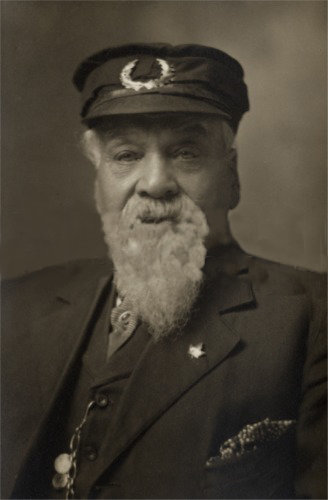Marshall Anderson – South Norwich & Woodstock, 1871 - 1925Marshall Anderson, or known as Marsh, was born in South Norwich in 1844. In 1871, when he was 27 years old, Marsh farmed on a rented property near Burgessville. He resided there with his first wife Sarah and their 3-year old daughter Frances. Following Sarah’s death, Marsh married her younger sister Mary. The family moved to Woodstock in 1881 where Marsh joined the Woodstock town fire brigade until the fire department was made a permanent one and moved to the fire hall on Perry Street. However, that same year, Mary died. According to Joyce Pettigrew’ book A Safe Haven The Story of Black Settlers in Oxford County, the Woodstock Fire Brigade wrote a letter to the editor of the newspaper as public note of condolence. During the 1890’s, Marsh was the municipality’s law enforcement and known as “Woodstock’s Faithful Night Watchman”. Hired by local merchants, this large Black man patrolled the city after dark when policing did not provide night coverage after six o’ clock. Lieutenant-Colonial John White came up with the idea of having Marsh protect stores and business at night. Marsh’s beat was from Vansittart Avenue to Wellington Street, on both sides of Dundas Street as well as the stores and business around City Hall Square. Marsh had an assistant; a large Newfoundland dog named “Duke.” The two made an effective team but Duke was poisoned when he was 11 years old. Marsh’s second dog was a Great Dane named “Seeker”. While Marsh tried the doors of the local merchants, Seeker would stand and wait. If there were any sign of trouble, Marsh would let Seeker in to investigate. He then would follow and make an arrest if need be. The beat back was in reverse; Seeker would lead the way down the allies behind the stores, followed by Marsh. If something usually was found, Seeker would “utter a deep growl and stand guard until Marsh” arrived with his gas lamp to investigate and make an arrest if necessary. If someone had to be placed in the lock-up, located in the cellar of the town hall, Marsh would lead the way, followed by the culprit and Seeker brining up the rear. It was reported that Marsh and Seeker never lost a prisoner. In the morning, the prisoner would be freed. However, not all people who stayed overnight in the county jail were criminals or vagabonds. According to the Oxford Historical Society, even a well known prosperous business man called the County Jail home for a night. Local historian, Ed Bennett, told the story how his father Bill Bennett Sr. first arrived in Woodstock by train in 1904. At 2 o’ clock in the morning Bill met Marsh and asked if a hotel would still be opened. Marsh offered Bill a bed in a section of the jail used as a hostel by prisoner’s dependents. Marsh told Bill that ‘it’s cheaper than a hotel!’ The senior Bennett accepted and he spent his first night in Woodstock as a guest of the County Jail. In the morning, Bill moved to the Oxford Hotel. After 40 years of public service, Marsh retired at age 81 in 1925, and was granted a pension for life by the Woodstock Police Commission. In 1932, Marshall Anderson died in hospital after succumbing to illness by his coal-gas oven. A poem written about Marshall Anderson that went: Go home to supper now. You proud business man. The “Seeker” and Marshall Will secure all your land. No crook will accost you No robbers appear For in spite of brave Marshall, It’s “Seeker” they fear. _______________________________________ 1 Oxford Historical Society. “History Quiz Contest #26” The Oxford Review, Saturday, April 1, 2000. p. 13. For #24 Question: Who was Marsh Anderson? Extra Information
Born in S. Norwich in 1844, by 1871 Marsh was farming a rented property near Burgessville with his first wife Sarah and 3-year-old daughter Frances. In 1881, having just moved to Woodstock, Marsh joined the Fire Department, leaving in the mid 1890s. Between 1888 and 1891, Marsh also worked as a policeman or guard, and was present when Reginald Birchall was hanged for murder in the yard of Oxford Jail, one November day in 1890. Ed Bennett, our local historian, tells us that when his father, Bill Bennett Sr., first arrived by train in Woodstock as an immigrant in 1904, it was nearly 2 a.m. in the morning. He met Marsh while walking and asked him where he could find a hotel that might still be open. The night watchman turned and led Ed’s dad to the County Jail, offering him a bed in the section of the jail normally used as a hostel by prisoners’ dependants (a custom at that time). It’s cheaper than a hotel!” Marsh said, in kindly encouragement. By then very tired, Ed’s Dad accepted and spent his first night in Woodstock as a guest of the County Jail. In the morning, Bill moved to the Oxford Hotel. |
|

